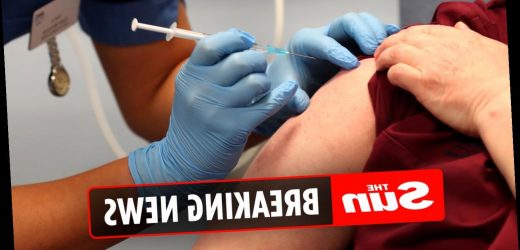THE next phase of Britain's Covid vaccine roll out will continue to be prioritised by age, scientific advisers have today confirmed.
People aged between 40 and 49 will be next in line for the jab, followed by the 30-39s age group and then all those 18 to 29.
? Read our coronavirus live blog for the latest news & updates…
The Joint Committee on Vaccination and Immunisation (JCVI) has said the move would "provide the greatest benefit in the shortest time".
It means teachers and police officers will not be able to jump the queue – despite massive pressure to speed up jabs for some in the public sector.
The JCVI concluded that the most effective way to prevent death and hospital admissions is to carry on prioritising people by age, rather than profession.
It said modelling studies for phase 2 of the vaccination programme also indicate that the speed of vaccine deployment is the most important factor in helping prevent severe illness and death.
This means that in phase 2, priority will be given in the following order:
- All those aged 40-49
- All those aged 30-39
- All those aged 18-29
These groups will be vaccinated once all those in phase 1 (the over-50s and most vulnerable) have received a jab.
Ministers aim to have all UK adults jabbed by July, while under-18s are not yet approved for the vaccine.
Professor Wei Shen Lim, Covid-19 chair for JCVI, said: "Vaccinations stop people from dying and the current strategy is to prioritise those who are more likely to have severe outcomes and die from Covid-19.
"The evidence is clear that the risk of hospitalisation and death increases with age.
"The vaccination programme is a huge success and continuing the age-based rollout will provide the greatest benefit in the shortest time, including to those in occupations at a higher risk of exposure."
'MORE COMPLEX'
The JCVI committee said vaccination targeting occupational groups (such as teachers) would be more complex to deliver and may slow down the vaccine programme, leaving some vulnerable people at higher risk for longer.
A UK Government spokesperson said: "Age is assessed to be the strongest factor linked to mortality, morbidity and hospitalisations, and because the speed of delivery is crucial as we provide more people with protection from Covid-19.
“All four parts of the UK will follow the recommended approach, subject to the final advice given by the independent expert committee.
"The UK Government remains on course to meet its target to offer a vaccine to all those in the phase one priority groups by mid-April, and all adults by the end of July.”
It's absolutely disgusting – they don't give a damn about us
But it has come as a blow to those who have been campaigning for teachers, police officers and other frontline key workers to be next on the list.
Metropolitan Police Federation chairman Ken Marsh criticised the Government: "It's absolutely disgusting – they don't give a damn about us.
"Prime Minister Boris Johnson and Home Secretary Priti Patel should hang their heads in shame."
'MAKES SENSE'
But scientists have supported the move to continue vaccinating on a age priority basis.
Professor Jonathan Ball, a virologist at the University of Nottingham, said: “We know that these vaccines are good at protecting from serious disease, and the likelihood of that increases with age.
"Therefore, continuing to target vaccine roll-out according to disease risk makes sense, especially if this simplifies the roll-out process.
"Hopefully we will still see strong vaccine uptake in those groups less likely to suffer from serious disease, as that will help us towards herd immunity and a future free from large numbers of cases of Covid-19.”
Dr Michael Head, senior researcher in Global Health at the University of Southampton, said continuing on an age priority basis is a "reasonable decision" to maintain the current pace of the vaccine roll out.
He added: “There have been discussions around prioritising other front-line workers, such as teachers.
"There is of course merit in this idea. However, the downside is how best to rapidly identify those most at risk among different groups of employees across sectors and efficiently offer them the vaccination.
"For example, do you just prioritise teachers, or also include bus and taxi driver and security staff? If not, then why not and which other job roles do you consider? Where is the dividing line in this risk assessment? It’s not an easy exercise and difficult to get right.
“With such additional complexities, this could simply slow down the roll-out and may delay the point that individuals would be offered the vaccine anyway.
"Therefore, on balance, I think this approach from the JCVI is the best way forward.”
It comes as the Queen urged those hesitant about having the coronavirus jab to get vaccinated.
The head of state, who was inoculated in January, said she understood that people who have never had a vaccine would find it "difficult" but encouraged them to "think about other people rather than themselves".
The Queen added: "Once you've had the vaccine you have a feeling of, you know, you're protected, which is I think very important."
On the success of the rollout so far, the Queen said: "I think it is remarkable how quickly the whole thing has been done and so many people have had the vaccine already."
Elsewhere, hundreds of thousands of people asked to shield in England are being invited for a coronavirus vaccine.
About 1.7 million more people were added to the shielding list last week after experts identified additional adults at serious risk of the virus and NHS England said some 600,000 of that group are now being invited to book a slot.
Meanwhile, new research indicated eight in 10 people from black, Asian and minority ethnic (BAME) backgrounds trust information about vaccines from family members more than from the Government and the media.
The British Red Cross, which commissioned the online survey, said the findings suggest family conversations could be key to tackling vaccine hesitancy among certain BAME groups.
Some 82 per cent of vaccine-hesitant people from BAME communities said they could be convinced to have a jab, with their main concerns ranging from side effects, speed of production and ingredients, the charity said.
It added that 81 per cent of BAME people polled said they would trust information from their family, which is higher than the Government (66 per cent) and mainstream media (50 per cent).
Government data up to February 24 showed a further 448,962 first doses of the coronavirus vaccine and 31,613 second jabs had been administered.
A further 323 people had died within 28 days of testing positive for Covid-19 as of Thursday and there had been a further 9,985 lab-confirmed cases in the UK.
Source: Read Full Article







